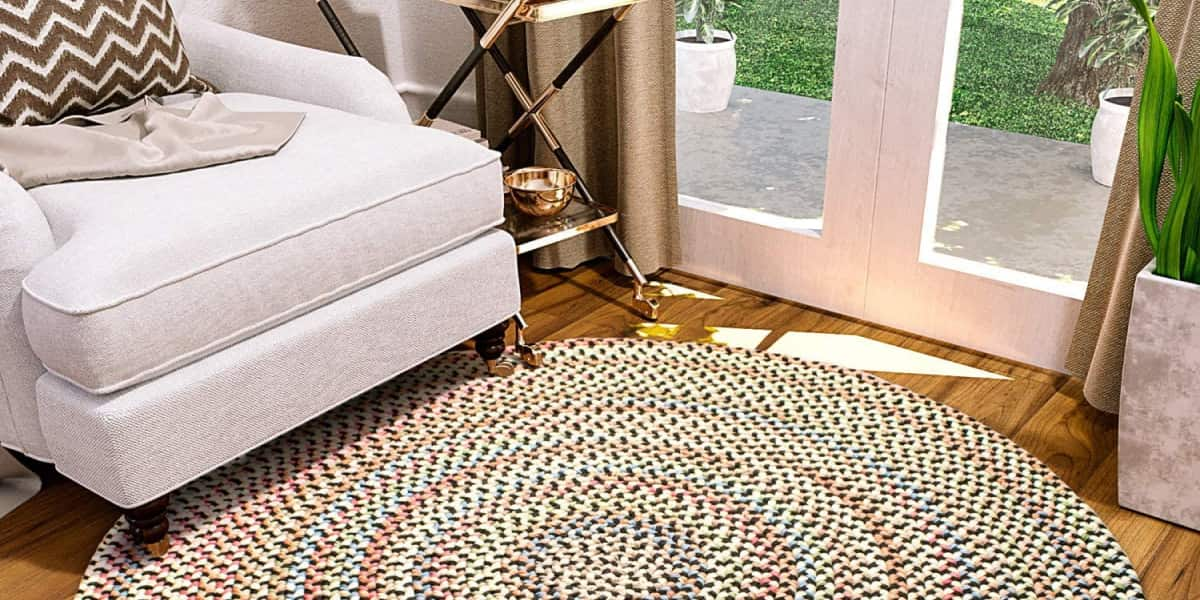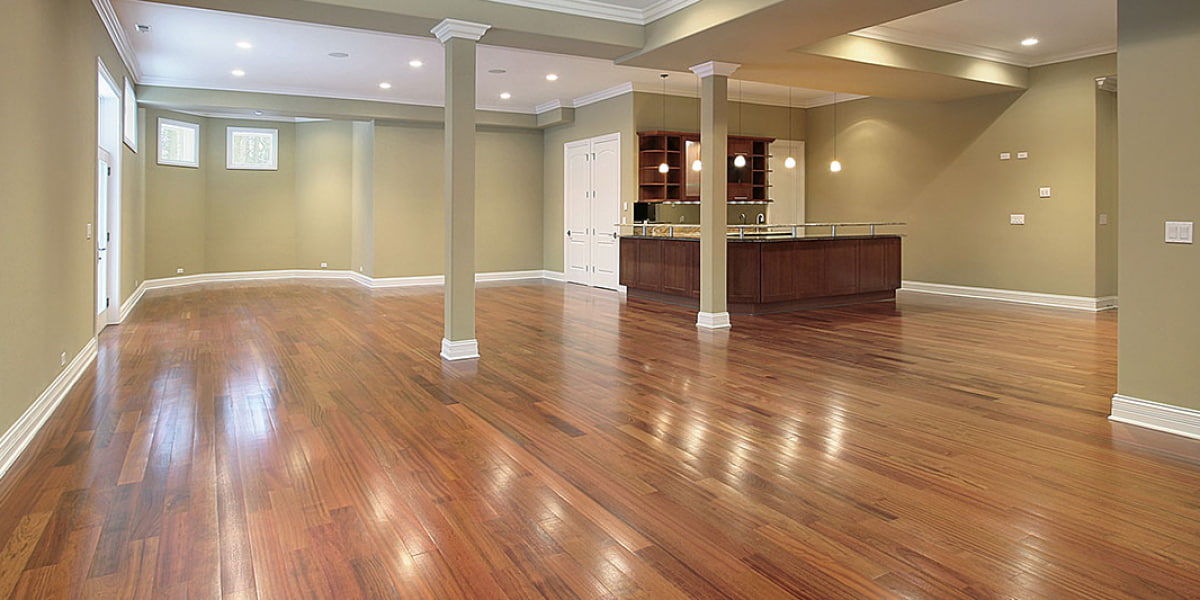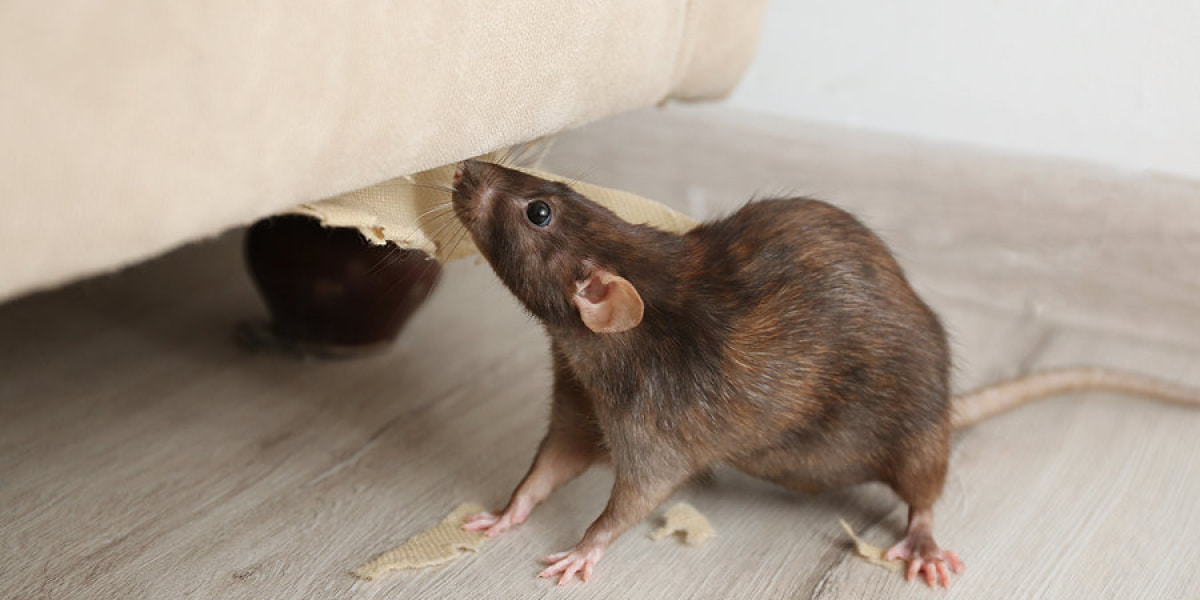Published on July 20th, 2022
Last updated on February 6th, 2023
How To Get Stains Out Of Granite Countertops? Getting Rid Of Any Stains Type
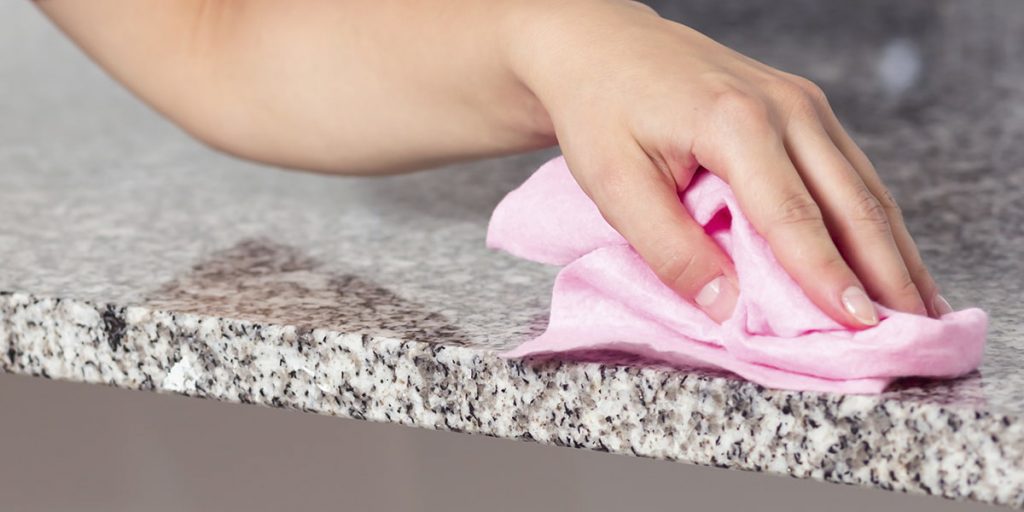
Granite is a natural stone that is frequently utilized both inside and outside of buildings. Granite tables, counters, staircases, and fireplaces embellish the interior of the building. It is used outside to clothe facades, create monuments, fountains, etc. Granite countertops have a smooth but porous surface, which allows spilled fluids and other heavily colored materials to easily permeate the material and leave stains that are challenging to get off, so it is vital to know how to do it properly.
Granite countertops require little upkeep over many years of regular usage. A spotless kitchen is a good sign that the hostess is also tidy. A clean countertop is the key to a neat kitchen. All of the cleaning efforts for getting stains out of granite are rendered functional by the stains that develop on the countertop.
However, it is still possible to use marble countertops in your home. Careful maintenance is required for these objects. Maintaining the marble countertop in its original condition with timely cleaning enhances the appeal of the kitchen design. Apply a fresh application to protect the countertop from filth whenever the protective coating becomes worn (often after 2-3 years).
In this post, I’ll explain how to use common home detergents to remove stains of different colors and forms and what to do if they persist despite your best efforts.
What Are The Benefits Of Using Granite Countertops?
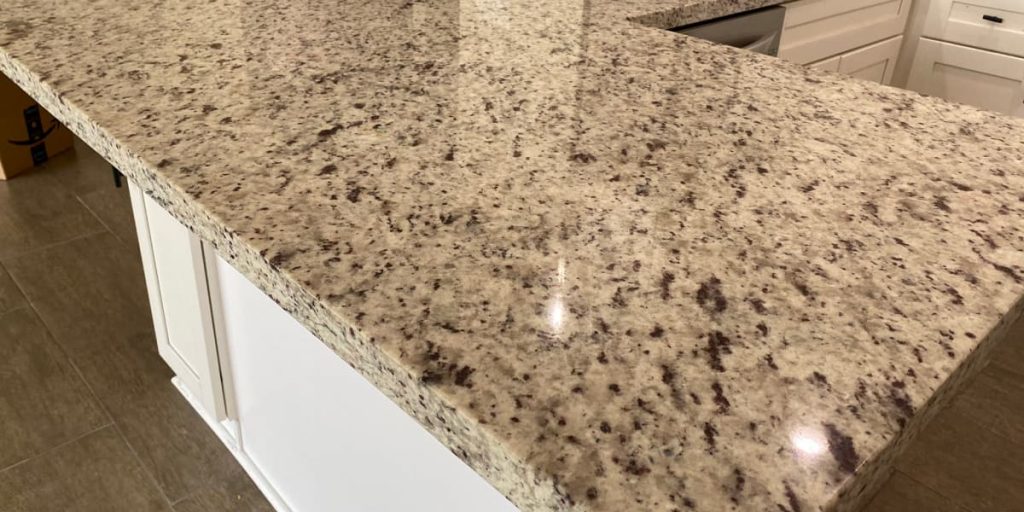
Despite their exorbitant cost, marble countertops are quite popular. However, there are some benefits:
- You may add subtle finishing touches to your design thanks to each shade’s individuality;
- You may select your color for each interior that will aesthetically complement any design, from traditional to futuristic;
- The material’s high practicality enables it to last very long. It takes some time to wipe; therefore, treating it carefully is necessary;
- Since the material’s structure is relatively natural, it complies with all legal and hygienic criteria;
- It is hypoallergenic;
- From cutting to polishing, marble also flawlessly passes all production steps.
Defining The Type Of Stain
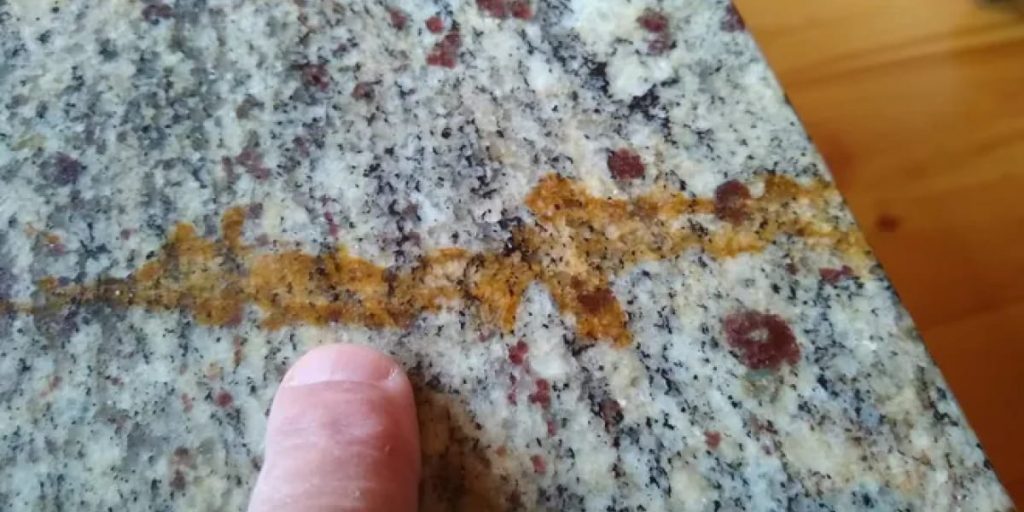
Granite is more resistant to physical damage and scratches than marble, but it still has to be handled with care and shielded from stains. Protection and cleaning are the two primary steps in taking care of a stained granite countertop. One should comprehend the cause and origin of stains before attempting to remove them from a stone. Rust, which takes the appearance of green traces from copper and brown from iron, develops in areas where granite comes into touch with metal bolts, nails, and other features. They are pretty challenging to get rid of, but rust-resistant stone cleansers will save the day.
In pools, contact with moss and mold causes the formation of vegetable stains. Cola or fruit juice spills should be cleaned up right at once since they will dull the stone’s shine. Hard water stains demand the use of specialized chemicals as well. Additionally, oil, blood, and lipstick stains are difficult to remove.
Granite-specific stain removers should be used for somewhat more tenacious stains; you may get them from a specialist stone supply store. On the market, several solutions effectively remove stains from granite countertops without using acids or alkalis or using amounts that are safe for the stone. The kind of spots in this instance is significant. You should concentrate on the granite stain remover’s characteristics to get the best outcome.
Removing Stains From Granite Countertops
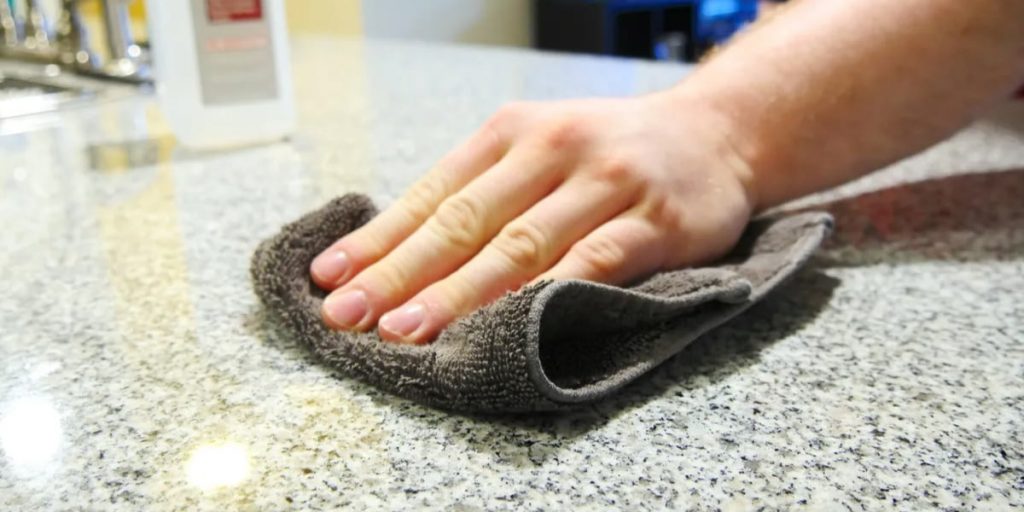
Because it’s simpler to prevent stains than to remove them, I suggest that you do as follows:
- The countertop must be cleaned every day with soapy water or a solution of any liquid detergent;
- Avoid using metal sponges when cleaning fake stone surfaces;
- Food should only be sliced on cutting boards;
- Putting hot things on a man-made stone is not advised;
- The countertop should be cleaned quickly if coloring material touches it.
Be cautious that granite can become damaged when exposed to cleaners that contain ammonia, vinegar, or lemon. Hire specialists to handle cleaning, including washing granite countertops, to prevent issues that cannot be remedied.
Removing Food And Liquid Spill Stains
Hydrogen peroxide can be used to get rid of organic contaminants that have been left behind in food and beverages as granite counter stains. They have a reddish tint and stand out, especially on light fabrics. Be careful to thoroughly wash the surface with warm water and dry it with a soft towel after using any cleaning agents.
If a liquid has spilled over the stone surface, gently dab it instead with a tiny amount of gentle detergent, remove any filth, and then completely dry.
Removing Oil Stains
Dark stains are left by fats and oils. Pouring an absorbent powder, such as starch, on the dirty region in two portions — one until the fat is absorbed, the other for a day — can be used to remove these impurities.
Additionally, 5 tbsp should be diluted in a glass of soda for oil-based stains on granite. For stains from water, use hydrogen peroxide in the water and add detergent until the mixture has the consistency of yogurt.
After combining them with broken chalk, you may also use gasoline or white spirit to clear the stone of fat and oil. The stain is covered with a smooth paste that is then removed after a few hours.
Removing Rust Stains
Rust and limescale are difficult to remove. And specific tools will undoubtedly be needed for this. Spots of the brown and yellow show particularly clearly on bright surfaces. Only the crystallization of the stone will assist if the process has begun and the rust has already reached deep inside; the procedure is difficult and expensive.
Removing Mold Stains
You can use an aqueous solution of hydrogen peroxide to remove the “stone bloom,” an infection with mold and fungus.
Removing Undefined Stain
If granite develops mysterious black patches, the coating was presumably improperly isolated from the underlying surfaces. To stop this contamination, it is advised to perform hydrophobization on that granite countertop stain, which seals the stone’s pores.
Getting Rid Of Abrasion
Abrasion of the top layer of natural stone is what professionals refer to as weathering. Some of the rock’s constituent minerals undergo metamorphosis; as a result, turning into iron hydroxide with a striking scarlet hue. This form of marble requires surface polishing and crystallization, which makes the removal of a stain on a granite countertop particularly challenging.
Removing White Markings From Hot Stuff
Artificial stone cannot withstand high temperatures without suffering damage. White markings are left on it from coming in touch with heated items. If a hot frying pan is unintentionally dropped on the countertop, it must be removed immediately, and the hot stain must be cleaned with warm and cold water. Water manipulations done quickly should be able to repair the surface. However, if they were ineffective, you would need to see experts who fix artificial stone items.
Cleaners For A Stain On A Granite Countertop
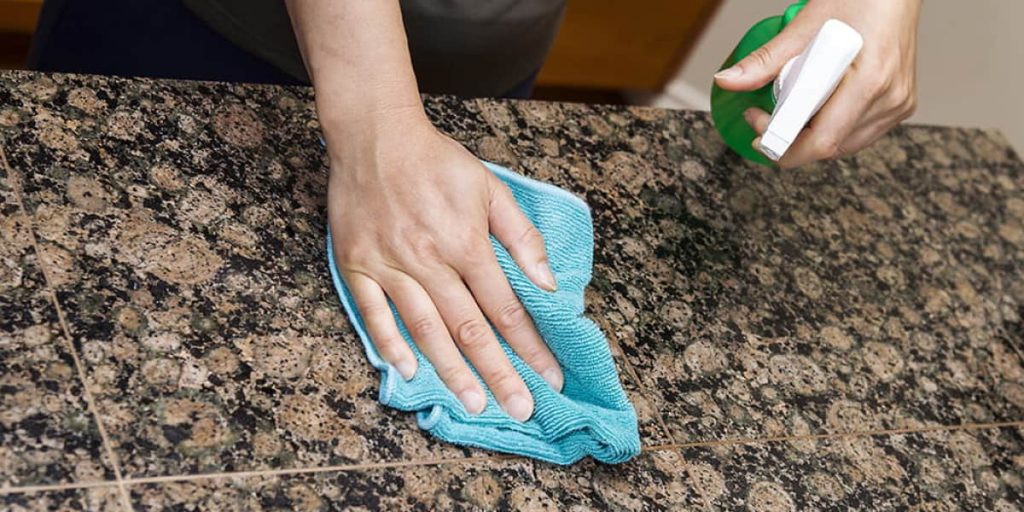
Additionally, you may get certain cleaners at the store. Long Life Akemi mold cleanser, which is free of acids and alkalis, is effective in removing biological contaminants (from moss, algae, flowers, and leaves). For a year, this substance offers mold protection.
A specialized adsorbing paste called Bellinzoni is used to remove stains from oil and cosmetics and a broad spectrum of organic and inorganic impurities. It is sufficient to spread a thin layer of paste, and after 8 to 10 hours, brush off the dry mixture.
The gel cleaning Mangiaruggine Bellinzoni or the liquid rust remover Tenax can both be used to remove rust. Applying for protection after cleaning is advised; suggested products include Hydrex and Proseal from Tenax. Lem-3, Bert-27, and Ultra Stripper for the removal of construction pollutants, mineral deposits, and calcium deposits.
FAQ
How to get stains off granite countertops?
You should be concerned about a few things. Granite countertops may be cleaned using non-abrasive cleansers or homemade solutions.


